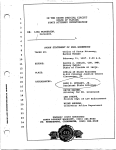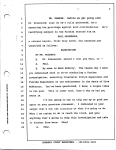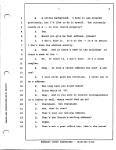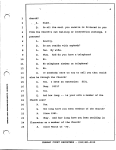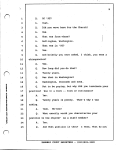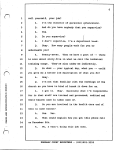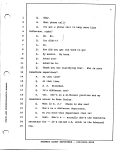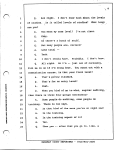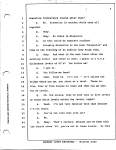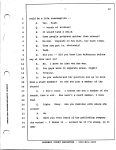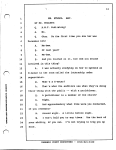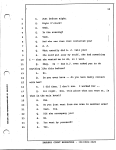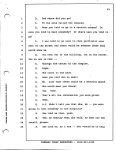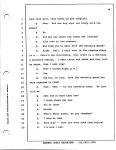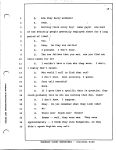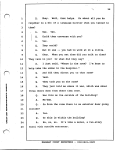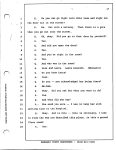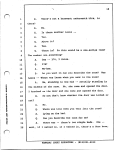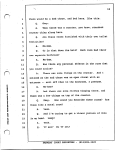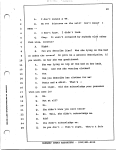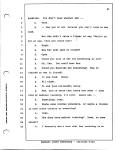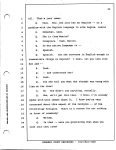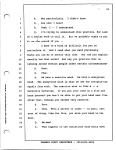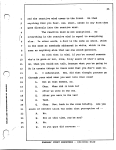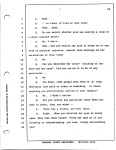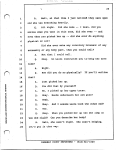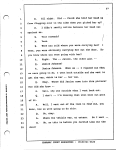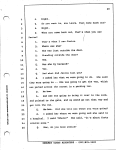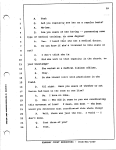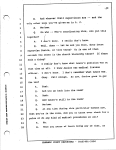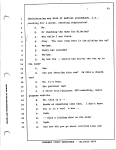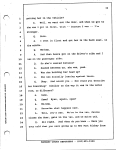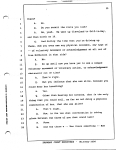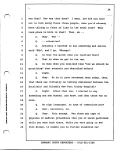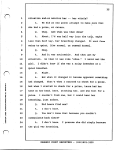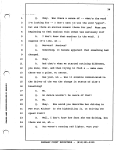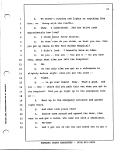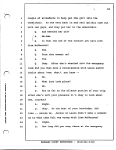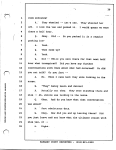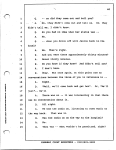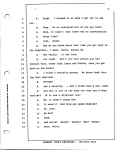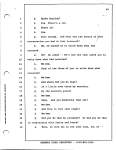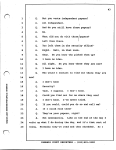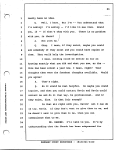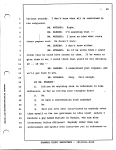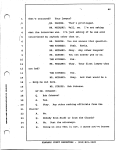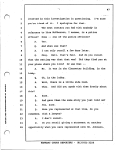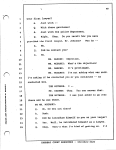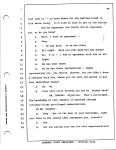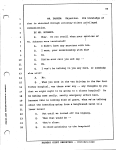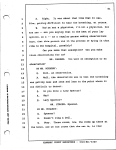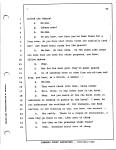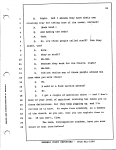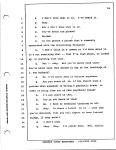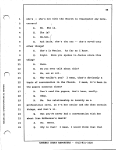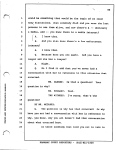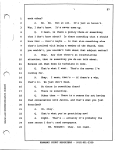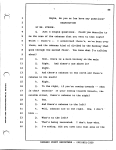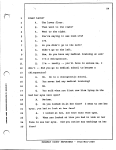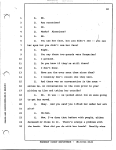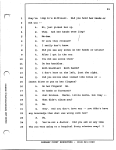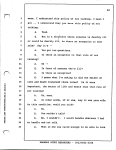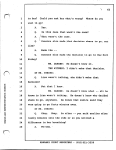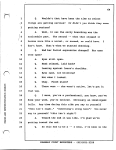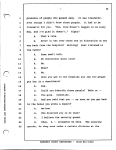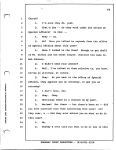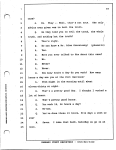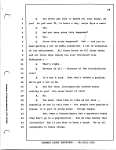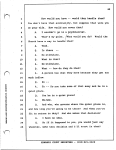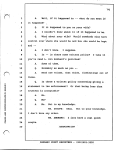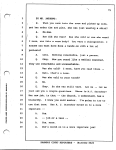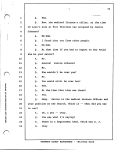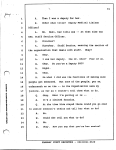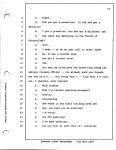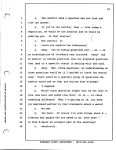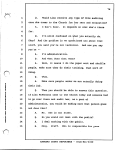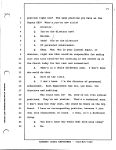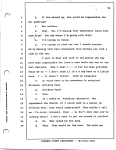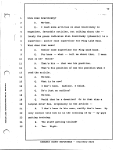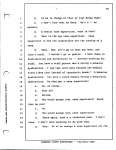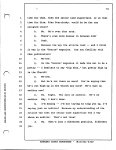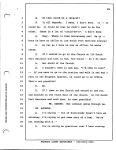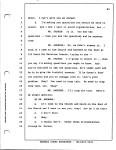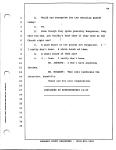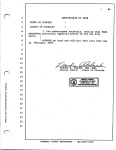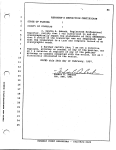Statement of Paul Greenwood
| Date: | February 11, 1997 |
| Pages: | 86 |
IN THE SIXTH JUDICIAL CIRCUIT STATE OP FLORIDA STATE ATTORNEY INVESTIGATION RE: LISA MCPHERSON, Deceased. 1, SWORN STATEMENT OF PAUL GREENWOOD TAKEN BY: Office of State Attorney, Bernie McCabe February 11, 1997. 9:00 a.m. BEFORE: Sandra A. Ambush, CSR, RMR, Notary Public State of Florida at large. PLACE: Office of State Attorney B-200 Criminal Justice Center Clearwater, FL APPEARANCES: MARK R. MCGARRY, JR. Assistant State Attorney KEVIN DARKEN, Attorney for Mr. Greenwood LEE STROPE, Florida Dept of Law Enforcement WAYNE ANDREWS, Clearwater Police Department KANABAY COURT REPORTERS TAMPA AIRPORT MARRIOTT, (813) 224-9500 ST. PETERSBURG, CLEARWATER, (813) 821-3320
Page 2
| MR. DARKEN: | Before we get going with Mr. Greenwood, just so he's fully protected, he's asserting his privilege against self-incrimination. He's testifying subject to the Florida Statute 914.04. |
PAUL GREENWOOD, a witness herein, first duly sworn, was examined and testified as follows:
EXAMINATION BY MR. MCGARRY:
| Q. | Mr. Greenwood, should I call you Paul, or -- |
| A. | Paul. |
| Q. | My name is Mark McGarry. The reason why I have you subpoenaed here is we're conducting a further investigation, assisting Clearwater Police Department and Florida Department of Law Enforcement in the death of Lisa McPherson. You've been questioned, I know, a couple times in the past. This is under oath, that's why we had you sworn in. I'm not going to try to trip you up or pick you apart on your previous statement. I indicated to your lawyer that's not the intention of what I'm going to do. What I am trying to do is reach the truth, and gain anything that's going to help this investigation and take it further from here. Okay? |
| A. | Okay. |
Page 3
| Q. | A little background. I know it was covered previously, but I'd like to do it myself. You currently reside on a - - on this church property? |
| A. | Yes. |
| Q. | Would you give me that address, please? |
| A. | I don't know it. It's on the -- it's on Saturn. I don't know the address exactly. |
| Q. | Okay. And is there a name of the building? Is there a name of the - - |
| A. | No. If there is, I don't know. It's a condo complex. |
| Q. | Okay. Is this a recent address for you? A new one? |
| A. | I just never paid any attention. I never use it as a address. |
| Q. | How long have you lived there? |
| A. | Since March of 95. |
| Q. | Okay. And if you were to receive correspondence or a letter or mail, where would that go to? |
| A. | Cleveland. 503 Cleveland. |
| Q. | Now, what is that? |
| A. | That's just our mailing address. |
| Q. | That's the Church's mailing address? |
| A. | Right. |
| Q. | That's not a post office box, that's the actual |
Page 4
| church? | |
| A. | Right. |
| Q. | So all the mail you receive is filtered to you from the Church's own mailing or interoffice workings, I presume? |
| A. | Exactly. |
| Q. | Do you reside with anybody? |
| A. | Yes. My wife. |
| Q. | Okay. And do you have a telephone? |
| A. | No. |
| Q. | No telephone number or telephone? |
| A. | No. |
| Q. | If somebody were to try to call you that would also be through the Church? |
| A. | Yes. I have an extension: X. |
| Q. | Okay. X? |
| A. | Yes. |
| Q. | And how long -- is your wife a member of the Church also? |
| A. | Yes. |
| Q. | How long have you been members of the Church? |
| A. | Since 1981. |
| Q. | Okay. And how long have you been residing in Clearwater as a member of the Church? |
| A. | Since March of 95. |
Page 5
| Q. | Of 95? |
| A. | Yeah. |
| Q. | Did you move here for the Church? |
| A. | Yes. |
| Q. | That was from where? |
| A. | Bellingham, Washington. |
| Q. | That was in 95? |
| A. | Yes. |
| Q. | And briefly you were asked, I think, you were a chiropractor? |
| A. | Yes. |
| Q. | How long did you do that? |
| A. | Twenty years. |
| Q. | Was that in Washington? |
| A. | Washington, Colorado and Iowa. |
| Q. | Not to be prying, but why did you terminate your practice? Was it a form - - form of retirement? |
| A. | Yes. |
| Q. | Twenty years is plenty. That's why I was asking. |
| A. | Yeah. Mm-hmm? |
| Q. | What exactly would you characterize your position in the church? As a staff member? |
| A. | Yes. |
| Q. | And what position is that? I mean, what do you |
Page 6
| call yourself, your job? | |
| A. | I'm the director of personnel enhancement. |
| Q. | And do you have anybody that you supervise? |
| A. | Yes. |
| Q. | Do you supervise? |
| A. | I don't supervise, I'm a department head. |
| Q. | Okay. How many people work for you or underneath you? |
| A. | Twenty-seven. Then we have a part of -- there is also about sixty-five in what we call the technical training corps. They're also under me indirectly. |
| Q. | So what -- your typical day, what you -- could you give me a better job description of what you do? |
| A. | Okay. |
| Q. | I'm not that familiar with the workings of the church so you have to kind of break it down for us. |
| A. | I got it. Okay. Basically what I'm responsible for is that staff are trained and processed, audited and their health care is taken care of. |
| Q. | So you are involved in the health care end of this to some extent? |
| A. | Yes. Yes. |
| Q. | That would explain how you got this phone call on December 5th. |
| A. | No, I wasn't doing this job then. |
Page 7
| Q. | Okay. |
| A. | What phone call? |
| Q. | You got a phone call to help move Lisa Mcpherson, right? |
| A. | No. No. |
| Q. | You didn't? |
| A. | No. |
| Q. | How did you get the word to go? |
| A. | My senior. My boss. |
| Q. | Asked you? |
| A. | Asked me to. |
| Q. | Thank you for clarifying that. Who is your immediate supervisor? |
| A. | At that time? |
| Q. | At that time. |
| A. | A. J. Strecker. |
| Q. | It's different now? |
| A. | Yes. She's in a different position and my immediate senior is Kate Curley. |
| Q. | What is A. J.? Where is she now? |
| A. | She's in a different department. |
| Q. | Do you know what department that is? |
| A. | Yeah. She's a -- actually she's the executive secretary for -- it's called 4-A, which is the Advanced Org. |
Page 8
| Q. | All right. I don't know much about the levels of studies. Is it called levels of studies? What level are you? |
| A. | You mean my case level? I'm not clear. |
| Q. | Okay. |
| A. | So there's a bunch of stuff. |
| Q. | Not many people are, correct? |
| A. | Like total -- |
| Q. | Yeah. |
| A. | I don't really know. Probably. I don't know. |
| Q. | All right. So I'm -- just out of curiosity, fill me in on if I'm wrong here. You start out with a communication course, is that your first level? |
| A. | That's pretty standard. |
| Q. | That's for an entry level? |
| A. | Yeah. |
| Q. | Then you kind of go to what, regular auditing, then there is three four groups thereafter? |
| A. | Some people do auditing, some people do training. There is two ways. |
| Q. | Is that kind of the area you're at right now? |
| A. | In the training. |
| Q. | In the training aspect of it? |
| A. | Yes. |
| Q. | Then you -- after that you go to, like, a |
Page 9
| dianetics furtherance course after that? | |
| A. | No. Dianetics is another whole area all together. |
| Q. | Okay. |
| A. | Okay. So there is dianetics. |
| Q. | So that would be separate studies? |
| A. | Actually dianetics is the book "Dianetics" and time in the training of an auditor they study that. |
| Q. | Okay. And what is the next level after the auditing level? And there is some, I guess it's O.T.s difference levels of OT's? You follow me? |
| A. | I got it. |
| Q. | You follow me here? |
| A. | Yeah. Kind of. It's not -- it's called the bridge where you go, you start at a level. There is, like, four or five levels to clear and then you go into the OT levels. |
| Q. | Oh, the levels, they're like four or five levels of those which levels within the levels, right? |
| A. | Yeah. I'm not very familiar with that because I'm not there. |
| Q. | You're not into that area yet? |
| A. | No. |
| Q. | Okay. That's curious, because you've been with the church since 81, you're not at those levels. So that |
Page 10
| could be a life consumption - - | |
| A. | Yes. Yeah. |
| Q. | -- worth of studies? |
| A. | It would take a while. |
| Q. | Some people progress quicker than others? |
| A. | Mm-hmm. Depends on how much, how much times. |
| Q. | Time you put in, obviously? |
| A. | Yeah. |
| Q. | Did you -- did you know Lisa McPherson before any of this went on? |
| A. | No. I have no idea who she was. |
| Q. | You guys were in separate areas, right? |
| A. | Totally. |
| Q. | Do you understand her position now as to have been a staff member? Or was she just a member of the church? |
| A. | I don't know. I assume she was a member of the church, that's all. She wasn't a staff member, I know that. |
| Q. | Right. Okay. Are you familiar with where she worked? |
| A. | No. |
| Q. | Have you ever heard of the publishing company she worked I think it correct me if I'm wrong, is it AMA? |
Page 11
| MR. DARKEN: | AMC. |
| BY MR. MCGARRY: | |
| Q. | A.M.C. Publishing? |
| A. | No. |
| Q. | Okay. So the first time you saw her was December 5th? |
| A. | Mm-hmm. |
| Q. | Of last year? |
| A. | Mm-hmm. |
| Q. | And you touched on it, how did you become involved in this thing? |
| A. | I was actually studying on how to operate an E-meter in the room called the internship under supervision. |
| Q. | What's a E-meter? |
| A. | That's what the auditors use when they're doing their thing with the public - - with a parishioner. |
| Q. | A parishioner is a member of the church? |
| A. | Right. |
| Q. | And approximately what time were you contacted, if you remember? |
| A. | Around eight. A little before eight. |
| Q. | I won't hold you to any times. Use the best of your ability, if you can. I'm not trying to trip you up here. |
Page 12
| A. | Just before eight. |
| Q. | Eight O'clock? |
| A. | Yeah. |
| Q. | In the evening? |
| A. | Yeah. |
| Q. | And who was that that contacted you? |
| A. | A.J. |
| Q. | What exactly did A. J. tell you? |
| A. | She said put away my stuff, she had something that she wanted me to do, so I went. |
| Q. | Okay. Is -- has A.J. ever asked you to do anything like this before? |
| A. | No. |
| Q. | Do you ever have - - do you have daily contact with her? |
| A. | I did then, I don't now. I worked for -- |
| Q. | All right. Now, this place that you were at, is that in the main hotel? |
| A. | Yes. |
| Q. | So you just went from one area to another area? |
| A. | Yeah. Yes. |
| Q. | Did she accompany you? |
| A. | No. |
| Q. | You went by yourself? |
| A. | Yes. |
Page 13
| Q. | And where did you go? |
| A. | To the area called the cabanas. |
| Q. | Were you told to go to a certain cabana? Or were you told to meet somebody? Or where were you told to go? |
| A. | I was told to go over to that particular area next to the street and there would be someone there that would show me. |
| Q. | You went out of the building, out on the street. You're now in that |
| A. | Through the center of the complex. |
| Q. | Right. |
| A. | The court to the back. |
| Q. | Were you told who to meet? |
| A. | No. Just that there would be a security guard. |
| Q. | Who would meet you there? |
| A. | Yes. Yeah. |
| Q. | That's all the information you were given? |
| A. | Yeah. |
| Q. | A.J. didn't tell you that she, ah -- you were going to take somebody to the hospital? |
| A. | She told me that, yeah. |
| Q. | Tell me exactly what she said, as best you can recall, please. |
| A. | She told me, as I was she wanted me to help |
Page 14
| take this girl, this woman to the hospital. | |
| Q. | Okay. Did she say what was wrong with the woman? |
| A. | No. |
| Q. | Did she say where the woman was located? |
| A. | Just over in the cabanas. |
| Q. | She told you to meet with the security guard? |
| A. | Right. Well, I went over in the complex there is a -- there's the internship, then there is a driveway, a security station. I went there and asked and they told me where, then I went over. |
| Q. | That's around eight p.m.? |
| A. | Yes. |
| Q. | Did you, in fact, find the security guard you were supposed to find? |
| A. | Yeah. They he was standing there. He just told me. |
| Q. | Just one or more than one? |
| A. | I think there was two. |
| Q. | Two of them? |
| A. | Mm-hmm. |
| Q. | What's their names, do you remember? |
| A. | I have no idea. |
| Q. | Were they have you ever seen them before? |
| A. | I'm sure I had. |
Page 15
| Q. | Are they daily workers? |
| A. | Yeah. |
| Q. | Working there every day? Same guys? Are most of the security people generally employed there for a long period of time? |
| A. | Yes. |
| Q. | Okay. Do they run shifts? |
| A. | I presume. I don't know. |
| Q. | The two fellows that you met, can you find out their names for me? |
| A. | I wouldn't have a clue who they were. I don't. I really don't recall. |
| Q. | Who would I call to find that out? |
| A. | I don't know. Call security, I guess. |
| Q. | Just call security? |
| A. | Sure. |
| Q. | If I gave them a specific date in question, they could probably tell me who was working that day, right? |
| A. | I don't know. I suppose. |
| Q. | Okay. Do you remember what they look like? |
| A. | No. |
| Q. | White men? Black men? Women? |
| A. | Seems -- well, they were men. They were approximately I think they were Hungarian, so they didn't speak English very well. |
Page 16
| Q. | Okay. Well, that helps. So about all you do remember is a bit of a language barrier when you talked to them? |
| A. | Yes. Yes. |
| Q. | Could they converse with you? |
| A. | Yes. |
| Q. | They could? |
| A. | But it was -- you had to work at it a little. |
| Q. | Okay. When you met them did you talk to them? They talk to you? Or what did they say? |
| A. | I just said, "Where is the room? I'm here to help take the woman to the hospital." |
| Q. | And did they direct you to that room? |
| A. | Yeah. |
| Q. | They took you to the room? |
| A. | They just told me where it was, which was about three doors down from where they were. |
| Q. | Was this on the outside of the building? |
| A. | Mm-hmm. |
| Q. | So from the room there is an exterior door going outside? |
| A. | Yes. |
| Q. | Or this is within the building? |
| A. | No, no, no. It's like a motel, a two-story motel with outside entrances. |
Page 17
| Q. | So you can go right into this room and right out the door out in the Street? |
| A. | No. Out onto a walkway. Then there is a gate that you go out onto the street. |
| Q. | Oh, okay. Did you go to that door by yourself? |
| A. | Yes. |
| Q. | And did you open the door? |
| A. | Yes. |
| Q. | And you're right in the room? |
| A. | Yes. |
| Q. | And who was in the room? |
| A. | Lisa and Laura. Laura Aranodo. (Phonetic) |
| Q. | Do you know Laura? |
| A. | Yeah. |
| Q. | So you -- you acknowledged her being there? |
| A. | Mm-hmm. |
| Q. | Okay. Did you ask her what you were to do? |
| A. | Yes. |
| Q. | And what did she say? |
| A. | -She said you were -- I was to help her with getting Lisa to the hospital. |
| Q. | Okay. And is this -- this is obviously, I take it from the way you described this place, is this a ground floor room? |
| A. | Yes. |
Page 18
| Q. | There's not a basement underneath this, is there? |
| A. | No. |
| Q. | Is there another level -- |
| A. | Yes. |
| Q. | Above it? |
| A. | Yes. |
| Q. | There is? So this would be a one-series room? The number one-something? |
| A. | One -- 174, I think. |
| Q. | 174? |
| A. | Mm-hmm. As you went in can you describe the room? Was Laura - - Where was Laura when you went in the room? |
| A. | Urn, standing in the mid - - actually standing in the middle of the room. No, she came and opened the door. knocked on the door and she came and opened the door. |
| Q. | So you don't know whether the door was locked or not? |
| A. | No. |
| Q. | Where was Lisa when you went into the room? |
| A. | Lying on the bed. |
| Q. | Can you describe the room for me? |
| A. | There was -- there's two single beds. One -- well, if I walked in, if I walked in, there's a door here, |
Page 19
| there would be a bed there, and bed here, like this. | |
| Q. | Okay. |
| A. | Then there was a counter, you know, standard counter thing along here. |
| Q. | Are these rooms furnished with their own toilet facilities? |
| A. | Mm-hmm. |
| Q. | Or is that down the hall? Each room had their own separate bathroom? |
| A. | Mm-hmm. |
| Q. | Was there any personal effects in the room that you could notice? |
| A. | There was some things on the counter. And I noticed at the end there was an open closet with an entrance -- exit of f that to the bathroom, I presume. |
| Q. | Mm-hmm? |
| A. | And there was some clothes hanging there, and there was a few things on top of the counter. |
| Q. | Okay. How would you describe these rooms? Are these like a motel room? |
| A. | Yeah. |
| Q. | And I'm trying to get a visual picture of this in my head. Lamp? |
| A. | Yeah. |
| Q. | TV set? No TV set? |
Page 20
| A. | I don't recall a TV. |
| Q. | No TV? Pictures on the wall? Don't know? I mean |
| A. | I don't know. I didn't look. |
| Q. | Okay. It wasn't occupied by anybody else other than Lisa, correct? |
| A. | Right. |
| Q. | Can you describe Lisa? Was she lying on the bed or under the covers? Or give me a general description, if you would, on how she was positioned. |
| A. | She was lying on top of the bed on her back. |
| Q. | Okay. And was she wearing clothes? |
| A. | Yes. |
| Q. | Can you describe her clothes for me? |
| A. | Pants and a shirt. That's -- |
| Q. | All right. Did she acknowledge your presence when you came in? |
| A. | No. |
| Q. | Not at all? |
| A. | No. |
| Q. | She didn't know you were there? |
| A. | No. Well, she didn't acknowledge me. |
| Q. | Huh? |
| A. | She didn't acknowledge me. |
| Q. | So you don't -- That's right. That's a fair |
Page 21
| question. You don't know whether she -- | |
| A. | Yeah. |
| Q. | -- saw you or not, because you can't look in her head. But she didn't raise a finger or say "Hello" or bat an eye, that you could tell? |
| A. | Right. |
| Q. | Was her eyes open or closed? |
| A. | Open. |
| Q. | Could you tell if she was breathing or not? |
| A. | Oh, Yes. You could hear her. |
| Q. | Could you describe her breathing? Was it labored or was it forced? |
| A. | It was loud. Noisy. |
| Q. | All right. |
| A. | It was just noticeably noisy. |
| Q. | Now, you're aware that Laura has some -- some kind of medical training, I'm told. Laura has -- |
| A. | Something, yeah. |
| Q. | Maybe some studies somewhere, or maybe a license in some other country or something? |
| A. | Yeah. |
| Q. | She does have medical training? Some, to some extent? |
| A. | I honestly don't know what her training is at |
Page 22
| all. That's just rumor. | |
| Q. | Okay. Now, she also has an English -- or a problem with the English language to some degree, Laura? |
| A. | Somewhat, yeah. |
| Q. | She is from Mexico? |
| A. | Someplace. Yeah, Mexico. |
| Q. | So her native language is -- |
| A. | Spanish. |
| Q. | Spanish. Can she converse in English enough to communicate things in English? I mean, can you talk with her and - - |
| A. | Yeah. |
| Q. | -- and understand her? |
| A. | Yeah. |
| Q. | Did she tell you what she thought was wrong with Lisa at the time? |
| A. | No. She didn't say anything, actually. |
| Q. | Now, we'll get into that. I know, I've already spoke with your lawyer about it. I know you're very concerned about this aspect of the religion - - of the Scientology Religion. There is a reason for not talking in front of somebody? |
| A. | Mm-hmm. |
| Q. | Is that -- were you practicing that when you came into that room? |
Page 23
| A. | Not particularly. I didn't know. |
| Q. | See what I mean? |
| A. | Yeah, I -- I understand. |
| Q. | I'm trying to understand this practice, for lack of a better word to call it. But we probably ought to put it on the record if you - - I know it's kind of difficult for you to articulate it. And I read what you said previously. Maybe you can do it better this time. But can you explain exactly how that works? And why you practice that no talking around certain people under certain circumstances? |
| A. | Sure. |
| Q. | Okay. |
| A. | We have a reactive mind. We have a analytical mind. The analytical mind is what we use for two-plus-two equals four with. The reactive mind is like a -- a defensive mechanism. If you put your hand on a fire and burn yourself you won't be able to get your hand near fire after that, because you become very reactive. |
| Q. | Sure. |
| A. | Okay. When a person is under -- in pain, that sort of thing, like the fire, you slam your hand in the door. |
| Q. | Mm-hmm? |
| A. | What happens is the analytical mind shuts down |
Page 24
| and the reactive mind comes to the front. So that anything that you hear, see, smell, sense in any form then goes directly into the reactive mind. The reactive mind is not analytical. So everything in the reactive mind is equal to everything else. In other words, a door is the same as smell, which is the same as somebody addressed in white, which is the. same as anything else that was one would perceive. So with that in mind, if you're around someone who's in pain or not, like, fully aware of what's going on, then you would not talk, because what you're going to do is create things in their mind that you don't want to. | |
| Q. | I understand. Now, did that thought process go through your mind when you went into that room? |
| A. | Not at that moment, no. |
| Q. | Okay. When did it kick in? |
| A. | After we were in the van. |
| Q. | After you were in the van? |
| A. | Yeah. |
| Q. | Okay. Now, back to the room briefly. Are you aware of whether Laura was under that perception of - - |
| A. | No. |
| Q. | Not at that time, you're not?. |
| A. | No. |
| Q. | So you guys did converse -- |
Page 25
| A. | Yeah. |
| Q. | -- in front of Lisa at that time? |
| A. | Yeah. Yeah. |
| Q. | Do you recall whether Lisa was wearing a long or a short sleeved shirt? |
| A. | No, I don't. |
| Q. | Well, did you notice any kind of sores on or any kind of physical injuries, unusual skin markings on her extremities at that time? |
| A. | No. |
| Q. | Can you describe her color? Coloring of her face and her arms? Did you notice it to be of any particular - - |
| A. | No. |
| Q. | You know, some people when they're ill they obviously look pale or ashen or something. Is there anything you particularly noticed in that respect? |
| A. | No. I didn't notice. |
| Q. | Did you notice any particular odors when you went in there, that you might - - |
| A. | There was a stuffy, not-well smell. |
| Q. | Right. When you describe her eyes as being open, does that mean fixed? Fixed and open as in not blinking or acknowledging, you know, things surrounding you? |
Page 26
| A. | Well, at that time I just noticed they were open and she was breathing heavily. |
| Q. | All right. Did she make I mean, did you notice when you went in this room, did she ever and even when you picked her up -- did she ever do anything physical at all? Did she ever make any voluntary movement of any extremity or any body part, that you could tell? |
| A. | Not that I could tell. |
| Q. | Okay. So Laura instructed you to help her move Lisa? |
| A. | Right. |
| Q. | How did you do so physically? If you'll outline that? |
| A. | Just picked her up. |
| Q. | You did that by yourself? |
| A. | No, I picked up her upper torso. |
| Q. | Okay. Hands underneath her arm pits? |
| A. | Yeah. |
| Q. | Okay. And I assume Laura took the other end? |
| A. | Yes. |
| Q. | Okay. When you picked her up was she limp or was she rigid? Can you describe her body? |
| A. | Well, she wasn't rigid. She wasn't helping, let's put it that way. |
Page 27
| Q. | All right. Did -- Could she hold her head up from flopping over to the side when you picked her up? |
| A. | I didn't really notice because her head was against me. |
| Q. | Your stomach? |
| A. | Yeah. |
| Q. | Were you told where you were carrying her? I mean, you were obviously carrying her out the door. Do you know where you were going with her? |
| A. | Right. The -- Janice, the other girl -- |
| Q. | Janice Johnson? |
| A. | Janice Johnson. When we -- I figured out what we were going to do, I went back outside and she went to get the van, which is her her van. |
| Q. | Okay. Where did Janice come into this picture? How did she know -- |
| A. | Well, she was outside when I went back out. |
| Q. | I don't -- I'm missing that went back out part of it. |
| A. | Well, I went out of the room to find out, you know, how we were going to do this. |
| Q. | Oh, okay. |
| A. | Where the vehicle was, et cetera. So I went -- |
| Q. | Oh, so this is before you carried Lisa out the door? |
Page 28
| A. | Right. |
| Q. | So you went in, saw Laura, then came back out? |
| A. | Right. |
| Q. | When you came back out, that's when you saw Janice? |
| A. | That's when I saw Janice. |
| Q. | Where was she? |
| A. | She was just outside the door. |
| Q. | Standing outside the door? |
| A. | Yes. |
| Q. | Was she by herself? |
| A. | Yes. |
| Q. | And what did Janice tell you? |
| A. | I asked her what we were going to do. She said they were going to -she was going to get the van, which was parked across the Street in a parking lot. |
| Q. | Mrn-hmm. |
| A. | And she was going to bring it over to the curb, and pointed to the gate, and we would go out that way and get into the van. |
| Q. | Mm-hmm. Did she tell you where you were going? |
| A. | I asked her where we were going and she said to a hospital. I said "Where?" She said, "It's about forty minutes away." |
| Q. | Now, do you know Janice? |
Page 29
| A. | Yeah |
| Q. | And you regularly see her on a regular basis? |
| A. | Mm-hmm. |
| Q. | Are you aware of her having -- possessing some type of medical training, to some degree? |
| A. | Yes. I heard that she was a medical doctor. |
| Q. | Do you know if she's licensed in this state or not? |
| A. | I don't think she is. |
| Q. | Did she work in that capacity in the church, to your knowledge? |
| A. | She worked as a medical liaison officer. |
| Q. | Okay. |
| A. | So she liased (sic) with physicians in the field. |
| Q. | All right. Were you aware of whether or not Janice had been in the room to see Lisa? |
| A. | No. I have no idea. |
| Q. | Who -- Who did it seem to you was coordinating this movement of Lisa? I mean, who best -. who best would you determine that coordinated this whole thing? |
| A. | Well, there was just the two. I would -- I don't know. |
| Q. | Just three of you? |
| A. | Yeah. |
Page 30
| Q. | And whoever their supervisors are -- and the only other name you've given me is A. sJ. |
| A. | Mm-hmm. |
| Q. | So who -- Who's coordinating this, who put this together? |
| A. | I don't know. I really don't know. |
| Q. | Well, does -- Let me ask you this, does Laura supervise Janice, or vice versa? Or is one of them outrank the other in the church hierarchy there? If there such a thing? |
| A. | I really don't know what Laura's position was at that time at all. I know Janice was medical liaison officer. I don't know. I don't remember what Laura was. |
| Q. | Okay. Fair enough. So now, Janice goes to get the van? |
| A. | Yeah. |
| Q. | And you go back into the room? |
| A. | Yeah. |
| Q. | And Laura's still in the room? |
| A. | Mm-hmm.. |
| Q. | At any time during this particular moment now, that you're in the room, did you or Laura ever check for a pulse or do any kind of medical procedures at all? |
| A. | No. |
| Q. | Were you aware of Laura doing any of that, or |
Page 31
| administering any kind of medical procedures, i.e.: checking for a pulse, checking respiration? | |
| A. | No. |
| Q. | Or checking the eyes for dilating? |
| A. | Not while I was there. |
| Q. | Okay. The next step here is the picking her up? |
| A. | Mm-hmm. |
| Q. | Carry her outside? |
| A. | Mm-hmm. |
| Q. | By now the - - Janice has driven the van up to the curb? |
| A. | Yes. |
| Q. | Can you describe this van? Is this a church van? |
| A. | No, its hers. |
| Q. | Her personal van? |
| A. | A white multi-purpose, MPV-something, multi purpose vehicle. |
| Q. | Oh, this is a -- |
| A. | Mazda or something like that. I don't know. |
| Q. | But it is a van? A box -- |
| A. | Yeah. |
| Q. | - - with a sliding door on the side? |
| A. | Yeah. |
| Q. | And how did you go about carrying Lisa and |
Page 32
| putting her in the vehicle? | |
| A. | Well, we went out the door, and when we got to the van I got in first, with -- because I was -- I'm stronger. |
| Q. | Sure. |
| A. | I went in first and got her in the back seat, in the middle. |
| Q. | Mm-hmm. |
| A. | And then Laura got on the driver's side and I was on the passenger side. |
| Q. | So she's seated between? |
| A. | Seated between us, she was, yeah. |
| Q. | Was she holding her head up? |
| A. | She was actually leaning against Laura. |
| Q. | Okay. And would you -- How would you describe her breathing? Similar to the way it was in the motel room, or different? |
| A. | Same. |
| Q. | Same? Eyes, again, open? |
| A. | Mm-hmm. |
| Q. | Describe what happens next. |
| A. | Well, let's see. We're in the van, Janice closes the door, gets in the van, and we drive off. |
| Q. | All right. And when do you know -- Were you ever told that you were going up to New Port Richey from |
Page 33
| there? | |
| A. | No. |
| Q. | Do you recall the route you took? |
| A. | An, yeah. We went up Cleveland to Gulf-to-Bay, and then north on 19. |
| Q. | And during the time that you're driving up there, did you ever see any physical movement, any type of - - of voluntary movement or acknowledgement at all out of Lisa Mcpherson in that ride? |
| A. | No. |
| Q. | So up until now you have yet to see a single voluntary movement or voluntary action, or acknowledgement whatsoever out of Lisa? |
| A. | That's right. |
| Q. | But you indicate that she was alive, because you could hear her breathing? |
| A. | Yes. |
| Q. | Other than hearing her breathe, that is the only thing that you could tell, as far as not doing a physical examination of her, that she was alive? |
| A. | That's right. |
| Q. | Now, in the van what conversation is taking place between the three of you that could talk? |
| A. | None. |
| Q. | And was there a -- Was there something -- How |
Page 34
| was that? How was that done? I mean, how did you know not to talk among those three people, when you'd already been talking in front of Lisa in the motel room? What took place to kick in that? That, ah -- | |
| A. | Okay. The --. - - situation? |
| A. | Actually I started to say something and Janice said "Shh", and I go, "Whoops". |
| Q. | Is that the point when you realized then? |
| A. | That is when we got in the van. |
| Q. | Is that when you realized then "now we should be practicing" that scenario you described before? |
| A. | Right. |
| Q. | Okay. So is it your statement here today, then, that there was virtually no talking whatsoever between the hotel (sic) and Columbia New Port Richey Hospital? |
| A. | Right. After that one, I started to say something and she hushed, you know, and then there was no more. |
| Q. | No sign languages, no type of communications? |
| A. | Well, basically, no. |
| Q. | Okay. Fair enough. Was there any type of physical or medical procedures that you or Laura performed while you were back there, while you were going to New Port Richey, to enable you to further establish her |
Page 35
| situation and-or monitor her - - her vitals? | |
| A. | We did at one point attempt to make pure that she had a pulse, et cetera. |
| Q. | Okay. And when was that done? |
| A. | About, I'd say half way into the trip, maybe less than half way, her breathing changed. I went from noisy to quiet, like normal, or seemed normal. |
| Q. | Okay. |
| A. | And it was noticeable. And that got my attention. So then it was like "whoa." I never met the girl. I didn't know if she was a noisy breather or a quiet breather. |
| Q. | Right. |
| A. | But when it changed it became apparent something had changed. That's when I started to check for a pulse. And when I started to check for a pulse, Laura had her hand on her head, here, stroking her, and she felt for a pulse. I couldn't find one, but I could hear her breathing, just softer. |
| Q. | Did Laura find one? |
| A. | I don't know. |
| Q. | You don't know that because you couldn't communicate back there? |
| A. | I don't know. I presume she did simply because the girl was breathing. |
Page 36
| Q. | Okay. Was there a sense of -- what's the word I'm looking for.. I don't want to use the word "panic", but was there an anxious moment there for you? Were you beginning to feel anxious this woman was seriously ill? |
| A. | I don't know that anxious is the word. I suppose it's like, um -- |
| Q. | Nervous?. Anxious? |
| A. | Something, it became apparent that something had changed. |
| Q. | Okay. |
| A. | And that's when we started noticing different, you know, that, and then trying to find a -- make sure there was a pulse, et cetera. |
| Q. | Was your, um -- Was it somehow communicated to the driver of the van the change in status of Lisa's breathing? |
| A. | No. |
| Q. | So Janice wouldn't be aware of that? |
| A. | No. |
| Q. | Okay. How would you describe her driving to New Port Richey? Is she highballing it, or driving the speed limit? |
| A. | Well, I don't know how fast she was driving, but there was no, ah -- |
| Q. | You weren't running red lights, were you? |
Page 37
| A. | We weren't running red lights or anything like that, no. Going with the traffic. |
| Q. | Okay. I understand. And the drive took approximately how long? |
| A. | I think -about forty minutes. |
| Q. | So what time do you think, as best you can, that you got up there to New Port Richey Hospital? |
| A. | I didn't look. I honestly have no idea. |
| Q. | Do you - - Are you - - You got a - - Do you know what, about what time you left the hospital? |
| A. | No. |
| Q. | So the only time you got as a reference is slightly before eight, when you got the word - - |
| A. | Right. |
| Q. | -- to go over there? Okay. That's good. Did you -- How -- where did you park this van when you got to the hospital? Did you go right up to the emergency room or - - |
| A. | Went up to the emergency entrance and parked right there. |
| Q. | And what took place then? |
| A. | Janice came around and opened the door, then went in and got a nurse, who came out with a wheelchair. |
| Q. | Mm-hmm? |
| A. | And I got out of the van and asked her to get a |
Page 38
| couple of attendants to help get the girl into the wheelchair. So she went back in and real quickly came out with two guys, and they put her in the wheelchair. | |
| Q. | And wheeled her off? Is that the end of the contact you have with Lisa McPherson? |
| A. | Yes. |
| Q. | From that moment on? |
| A. | Yes. |
| Q. | Okay. After she's wheeled into the emergency room did you then have a conversation with Laura and/or Janice about "wow, what", you know -- |
| A. | No. |
| Q. | What just took place? |
| A. | No. |
| Q. | But as far as the silence portion of your trip, after she's left your presence it's okay to talk about her, correct? |
| A. | Right. |
| Q. | Okay. To the best of your knowledge, did Lisa -- excuse me. Janice or Laura didn't make a comment as to what they felt was wrong with Lisa McPherson? |
| A. | Right. |
| Q. | How long did you stay there at the emergency |
Page 39
| room entrance? | |
| A. | They wheeled -- Let's see. They wheeled her off. I took the van and parked it. I would guess we were there a half hour. |
| Q. | Okay. Did -- So you parked it in a regular parking lot? |
| A. | Yeah. |
| Q. | Then came up? |
| A. | Yeah. |
| Q. | Did -- While you were there for that next half hour what transpired? Did you have any further. conversations with them about what had occurred? Or did you not talk? Or you just.-- |
| A. | No. When I came back they were talking to the nurse. |
| Q. | "They" being Laura and Janice? |
| A. | Actually not they. They were standing there and Lisa -- An, Janice was talking to the nurse. |
| Q. | Okay. And do you know what that conversation was about? |
| A. | Just admittance data. |
| Q. | Okay. How did you end up leaving there? Did you just leave and not know what the ultimate result with Lisa was, or |
| A. | Right. - |
Page 40
| Q. | -- or did they come out and tell you? |
| A. | No, they didn't come out and tell us. Or, they didn't tell me, I didn't know. |
| Q. | So you had no idea what her status was -- |
| A. | No. |
| Q. | -- when you drove off with Janice back to the hotel? |
| A. | No. That's right. |
| Q. | And you were there approximately thirty minutes? |
| A. | About thirty minutes. |
| Q. | Do you know if they knew? And didn't tell you? |
| A. | I don't know. |
| Q. | Okay.. But once again, at this point now no conversations between the three of you in reference to - - |
| A. | Right. |
| Q. | "Well, we'll come back and get her". Or, "We'll just"-- We'll |
| A. | There was no - - It was interesting in that there was no conversation about it. |
| Q. | All right. |
| A. | We had the radio on, listening to some music on the way back. That was it. |
| Q. | Was the radio on on the way to the hospital? |
| A. | No. |
| Q. | That, was - - That wouldn' t be permitted, right? |
Page 41
| A. | Right. So turned it on when I got out in the van. |
| Q. | Okay. So no conversations on the way back? |
| A. | Well, it wasn't that there was no conversation. |
| Q. | About Lisa? |
| A. | Yeah. Right. |
| Q. | And do you know about what time you got back to the hospital-- I mean, hotel, excuse me. |
| A. | Not really. It was late. |
| Q. | All right. Who's the next person you had contact with, other than Laura and Janice, once you got back to the hotel? |
| A. | I think a security person. We drove back into the Fort Harrison. |
| Q. | Mm-hmm? |
| A. | And a security -- And I think that's who, yeah. |
| Q. | And was it one of the same two that you'd seen earlier? Or it was a different one? |
| A. | No, it wasn't those two. |
| Q. | It wasn't? Did this guy speak English? |
| A. | Oh, yeah. |
| Q. | He did? |
| A. | Yeah. |
| Q. | And white? Black? Female? Man? Woman? |
| A. | Male, white. |
Page 42
| Q. | Spoke English? |
| A. | Yes. There's a lot. |
| Q. | There is? |
| A. | Yes. |
| Q. | Fair enough. And what was the nature of that conversation you had at that interval? |
| A. | Um, he wanted us to write down what had occurred. |
| Q. | Oh? He asked -- He's the one that asked you to write down what had occurred? |
| A. | Mm-hmm. |
| Q. | Each of the three of you to write down what occurred? |
| A. | Mm-hmm. |
| Q. | And where did you do that? |
| A. | In a little room there by security. |
| Q. | By the security place? |
| A. | Mm hm. |
| Q. | Okay. And you handwrote that out? |
| A. | Mm-hmm. |
| Q. | And this is that same night? |
| A. | Mm-hmm. |
| Q. | Did you do that by yourself? Or did you do that in conjunction with Janice and Laura? |
| A. | Well, we were all in the same room, but we - - |
Page 43
| Q. | But you wrote independent papers? |
| A. | All independent. |
| Q. | And do you still have those papers? |
| A. | No. |
| Q. | What did you do with those/Papers? |
| A. | Left them there. |
| Q. | You left them in the security office? |
| A. | Right. Well, in that room. |
| Q. | Okay. Do you know who picked them up? |
| A. | I have no idea. |
| Q. | All right. Do you know where they are now? |
| A. | I have no idea. |
| Q. | Who would I contact to find out where they are now? |
| A. | I don't know |
| Q. | Security? |
| A. | Yeah, I suppose. I don't know. |
| Q. | Could you find out for me where they are? |
| A. | I don't know. I've never tried. |
| Q. | If you could, could you do so and call me? |
| A. | If I could find them? |
| Q. | They're your papers, right? |
| A. | Not necessarily. Like at the end of the day I write up what I do during the day, and it's that sort of thing. Normally they're read and then shredded. So I |
Page 44
| really have no idea. | |
| Q. | Well, I know. But I'm -- You understand what I'm asking? I'm asking -- I'd like to see them. Would you, if -- If that's okay with you. There is no problem with you, is there? |
| A. | Not with me. |
| Q. | Okay. I mean, if they exist, maybe you could ask somebody if they exist and you could have copies Of them. That would help the investigation. I mean, nothing could be better as far as knowing exactly what you did and what you saw, as the - - this has been almost a year now, I mean, right? Your thoughts then were the freshest thoughts available. Would you agree? |
| A. | That's right. |
| Q. | So it would be real helpful. So maybe you could inquire, and then you could contact Kevin and Kevin could contact me and do it that way, be professional. And if they exist, fine. Is that fair enough? Is that all right with you, Kevin? All I. can do is try, Kevin. If they don't want to give them to me, and he doesn't want to give them to me, then you can communicate that to me. |
| MR. DARKEN: | I'll talk to you. It's my understanding that the Church has been subpoenaed for |
Page 45
| various records. I don't know what all is contained in the subpoenas. | |
| MR. MCGARRY: | Right. |
| MR. DARKEN: | I'm assuming that -- |
| MR. MCGARRY: | I have no idea what route these papers took. He doesn't know. |
| MR. DARKEN: | I don't know either. |
| MR. MCGARRY: | So if he wrote them I would think that he could have access to them. If he wants to give them to me, I would think that would be his decision, if - - if the - - |
| MR. DARKEN: | I understand your request, and we'll get back to you. |
| MR. MCGARRY: | Okay. Fair enough. |
| BY MR. MCGARRY: | |
| Q. | Did you do anything else in reference to Lisa McPherson, as far as writing your thoughts down? |
| A. | No. |
| Q. | Or have a conversation with anybody? |
| A. | No. |
| Q. | Have you ever been interviewed by anybody other than myself or the two gentlemen in this room? And/or I believe a guy named Suttler or Tunnis, who are also Clearwater Police Officers? Anybody other than law enforcement and myself ever interview you in reference to |
Page 46
| what's occurred? Your lawyer? | |
| MR. DARKEN: | That's privileged. |
| MR. MCGARRY: | Well, no. I'm not asking what the interview was.. I'm just asking if he was ever interviewed by anybody other than us. |
| MR. DARKEN: | You can answer that question. |
| THE WITNESS: | Yeah. Kevin. |
| MR. MCGARRY: | Okay. Any other lawyers? |
| MR. DARKEN: | You can answer yes or no. |
| THE WITNESS: | Yes. |
| MR. MCGARRY: | Okay. Your first lawyer that you had? |
| THE WITNESS: | Yes. |
| MR. MCGARRY: | Okay. And that would be a Help me out here. |
| MR. DARKEN: | Bob Johnson. |
| BY MR. MCGARRY: | |
| Q. | Bob Johnson? |
| A. | Yes. |
| Q. | Okay. Any other ranking officials from the Church? |
| A. | No. |
| Q. | Nobody from Staff or from the Church? |
| A. | No. Just the attorneys. |
| Q. | Going on into what it now, I guess you've become |
Page 47
| involved in this investigation in questioning. I'm sure you're tired of it. I apologize for that. The next contact you had with anybody in reference to Lisa McPherson, I assume, is a police officer? Some - - one of the police officers? | |
| A. | Yes. |
| Q. | And when was that? |
| A. | I can only recall a few days later. |
| Q. | Okay. Well, that's fair. And do you recall what the setting was that that was? Did they find you at your place where you live? Or was that |
| A. | No. It was in the Clearwater building, in the lobby. |
| Q. | Oh, in the lobby. |
| A. | Well, there is a little side room. |
| Q. | Okay. And did you speak with them freely about this? |
| A. | Sure. |
| Q. | And gave them the same story you just told us? |
| A. | Yes, sure.. |
| Q. | Were you represented at that time, do you remember, with a lawyer? |
| A. | I don't recall. |
| Q. | Do you recall giving a statement at another opportunity when you were represented with Mr. Johnson, |
Page 48
| your first lawyer? | |
| A. | Just with |
| Q. | With these gentlemen? |
| A. | Just with the police department. |
| Q. | Right. Okay. Do you recall how you were provided the first lawyer, Mr. Johnson? Was he -- |
| A. | No. |
| Q. | Did he contact you? |
| A. | No. |
| MR. DARKEN: | Objection. |
| MR. MCGARRY: | What's the objection? |
| MR. DARKEN: | It's privileged. |
| MR. MCGARRY: | I'm not asking what was said. I'm asking if he contacted you or you contacted -- he contacted him. |
| THE WITNESS: | I -- |
| MR. DARKEN: | Okay. You can answer that. |
| THE WITNESS: | I was just asked to go over there and he was there. |
| BY MR. MCGARRY: | |
| Q. | Oh, he met you there? |
| A. | Yeah. |
| Q. | Did he introduce himself to you as your lawyer? |
| A. | Yes. Well, he introduced himself as a lawyer. |
| Q. | Okay. That's what I'm kind of getting at. I'd |
Page 49
| just like to - - to know where all the parties stood in this whole thing. It's kind of hard to get to the bottom. Did he represent the Church did he represent you, or do you know? | |
| A. | Well, I have no agreement |
| Q. | Okay. |
| A. | -- of any kind. So he was there. All right. Have you ever paid him any money? |
| A. | No. I've I had no agreement with him at all. |
| Q. | Right. |
| A. | He was just there. |
| Q. | So he was, there representing -- maybe representing you, the Church, whoever, but you didn't have a contract with him, where you sat down and agreed to pay that individual money? |
| A. | No. No. |
| Q. | Does that exist between you and Mr. Darken here? |
| MR. DARKEN: | Objection. That's privileged. His knowledge of that subject is obtained through attorney-client privileged communications. |
| BY MR. MCGARRY: | |
| Q. | Okay. But to the best of your knowledge, right now, this is the lawyer that represents you, correct? |
| A. | Yes. |
| Q. | Are you paying this man for this representation? |
Page 50
| MR. DARKEN: | Objection. His knowledge of that is obtained through attorney-client privileged communication. |
| BY MR. MCGARRY: | |
| Q. | Okay. Do you recall when your services of Mr. Johnson were terminated? |
| A. | I didn't have any services with him. |
| Q. | I mean, your relationship with him? |
| A. | No. |
| Q. | Did he ever call you and say -- |
| A. | No. |
| Q. | I won't be talking to you any more, or somebody else will? |
| A. | No. |
| Q. | , When you were in the van driving to the New Port Richey hospital, was there ever any - - any thoughts by you that we might ought to be going to a closer hospital? Or be making some really, really emergency effort here, because this is looking kind of grave, when we're talking about the breathing going from a heightened level to a lower level? |
| A. | Not until we turned off the highway. |
| Q. | Then that would be -- |
| A. | That's close. |
| Q. | In close proximity to the hospital? |
Page 51
| A. | Right. It was about that time that it was, like, getting difficult to hear the breathing, et cetera. |
| Q. | You're not a physician, I'm not a physician, but are you - - are you saying that to the best of your lay opinion, as a - - as a regular person making observations here, that this person was in the process of dying in that ride to the hospital, possibly? Can you make that assumption? Can you make those observations for us? |
| MR. DARKEN: | You want an assumption or an observation? |
| BY MR. MCGARRY: | |
| Q. | Well, an observation. |
| A. | Well, the observation was, is that the breathing was getting less and less and less to the point where it was difficult to detect. |
| Q. | Do you know a Lacy Spector? |
| A. | Who? |
| Q. | Lacy Spector? |
| MR. DARKEN: | Spencer. |
| BY MR. MCGARRY: | |
| Q. | Spencer? |
| A. | Doesn't ring a bell. |
| Q. | Okay Those rooms, now, the rooms up there at the hotel, one of the rooms that she was in, is that |
Page 52
| called the Cabana? | |
| A. | Mm-hmm. |
| Q. | Cabana area? |
| A. | Mm-hmm. |
| Q. | Do you know, now that you've been there for a long time, do you know what those rooms are typically used for? Are those hotel rooms for the guests? |
| A. | Mm-hmm. On that side. On the other side there are some that are used for other purposes, you know, office spaces. |
| Q. | Okay. |
| A. | But for the most part they're guest spaces. |
| Q. | So if somebody were to come from out-of-town and stay, you know, as a Church, a member - - |
| A. | Mm-hmm. |
| Q. | They would check into that, those rooms? |
| A. | Well, those, or any other room in the hotel. |
| Q. | Okay. Are you aware of how the hotel works in reference to tending to guests at the hotel? I mean, do you understand the workings of, for instance, the food service, or the cleaning or the, you know, the contact -- |
| A. | Not really. There is a couple of restaurants, I know they go there to eat, that sort of thing. |
| Q. | Are they on the premises right there? |
| A. | Yeah. Standard hotel sort of thing. |
Page 53
| Q. | Right. And I assume they have their own cleaning crew for taking care of the rooms, correct? |
| A. | (Nods head.) |
| Q. | And making the beds? |
| A. | Yeah. |
| Q. | So, are those people called staff? Are they staff, too? Sure. |
| Q. | They're staff? |
| A. | Mm-hmm. |
| Q. | Because they work for the Church, right? |
| A. | Mm-hmm. |
| Q. | Did you notice any of those people around the room when you were there? |
| A. | No. |
| Q. | A maid or a food service person? |
| A. | No. |
| Q. | I got a couple of questions about -- and I don't know if your level of spiritual training has taken you to these definitions, but they keep popping up, and I'm curious as to know. So maybe from somebody, as a member of the church, as you are, that you can explain them to me. If you can't, fine. The term, introspective rundown, have you ever heard of that term before? |
Page 54
| A. | I don't know what it is. I've heard it. |
| Q. | Okay. |
| A. | But I don't know what it is. |
| Q. | You've heard the phrase? |
| A. | Mmhmm. |
| Q. | Is the phrase a phrase that's commonly associated with the Scientology Religion? |
| A. | I don't think it's common or I'd know about it. It's not something that -- that I've read about, or looked up, or anything like that. |
| Q. | But -- okay. But you've never read that? You've never seen that phrase in any of the teachings of L. Ron Hubbard?' |
| A. | No, I've never seen it written anywhere. |
| Q. | Are you aware of, urn, if the church uses a process when somebody is having a psychotic break, in order to bring them out of that psychotic break? |
| A. | I'm not aware of that. , |
| Q. | You're not aware of that? |
| A. | No. I have no technical training at all. |
| Q. | Okay. Is there a level? Is it -- over what you've obtained, that you will expect to have learned things, if they exist? |
| A. | I don't know. |
| Q. | Okay. Okay. I'm almost done. Now, Janice, |
Page 55
| she's -- she's not with the Church in Clearwater any more, correct? | |
| A. | No. She is. |
| Q. | She is? |
| A. | Mm-hmm. |
| Q. | And Laura, she's the one --she's moved onto other things? |
| A. | She's in Mexico. As far as I know. |
| Q. | Right. Have you spoken to Janice since this thing? |
| A. | Sure. |
| Q. | Do you ever talk about this? |
| A. | No, not at all. |
| Q. | Why wouldn't you? I mean, that's obviously a topic of conversation in the Church. I mean, it's been in the papers numerous times? |
| A. | Don't read the papers, don't know, really. |
| Q. | Okay. |
| A. | No. Our relationship is totally on a professional level, as I'm her senior and she does certain things, and that's it. |
| Q. | But you've never had a conversation with her about Lisa McPherson's death? |
| A. | No. Never. |
| Q. | Why is that? I mean, I would think that that |
Page 56
| would be something that would be the topic of at least many discussions, when somebody died and you were the last persons to see them alive, and now there's a,-- obviously a media, and - - you know there is a media interest? | |
| A. | I know that. |
| Q. | And you also know there's a law enforcement interest? |
| A. | I know that. |
| Q. | Because here you are again. And you have a lawyer and she has a lawyer? |
| A. | Right. |
| Q. | So I find it odd that you've never had a conversation with her in reference to this situation that occurred. |
| MR. DARKEN: | Is that a question? Your question is why? |
| MR. MCGARRY: | Yeah. |
| THE WITNESS: | I'm sorry, what's the question? |
| BY MR. MCGARRY: | |
| Q. | The question is why has that occurred? Or why have you not had a conversation with her in reference to why, you know, why you all haven't had ,that conversation about what occurred here. Is there somebody that told you not to talk to |
Page 57
| each other? | |
| A. | No. No. Not at all. It's just we haven't. Why, I don't know. It's never come up. |
| Q. | I mean, is there a policy there or something that I don't know about? Is there something that I should know that -- that's maybe -- is that also something else that's involved with being a member of the Church, that you wouldn't, you-wouldn't talk about that subject matter? |
| A. | Okay. Any time there's an enturbulating situation, that is something you do not talk about. Because all that does is turbulate it more. |
| Q. | That's what I want. That's the answer I'm looking for. |
| A. | Okay. I mean, that's -- if there's a why, that's it. We just don't mean. |
| Q. | So there is something there? |
| A. | There is something. |
| Q. | Other than There is a reason for not having that conversation with Janice, and that's what you just described? |
| A. | Oh, okay. |
| Q. | That's what you're practicing now? |
| A. | Right. That's -- actually it's probably the same reason I don't read newspapers. |
| MR. MCGARRY: | Okay. All right. |
Page 58
| Wayne, do you or Lee have any questions? |
EXAMINATION BY MR. DARKEN:
| Q. | Just a couple questions. Could you describe to me the area of the cabanas that you went to that night? Which -- there's -- I understand there's, we've been over there, and the cabanas kind of divided by the hallway that goes through the second floor. You know what I'm talking about? |
| A. | Well, there is a main hallway on the main |
| Q. | Right. And there's' one above it? |
| A. | Right. |
| Q. | And there's cabanas to the north and there's cabanas to the south? |
| A. | Right. |
| Q. | To the right, if you're coming towards -- what is that? Osceola? If your coming towards Osceola, the outside street, there's cabanas to the right? |
| A. | Yes. |
| Q. | And there's cabanas to the left? |
| A. | Well, cabanas are to the right. Now, I don't know |
| Q. | What's to the left? |
| A. | That's being renovated. I don't know what. |
| Q. | I'm asking, did you come into that area or the |
Page 59
| lower level? | |
| A. | The lower floor. |
| Q. | Then went to the right? |
| A. | Went to the right. |
| Q. | You're saying it was room 174? |
| A. | 174. |
| Q. | So you didn't go to the left? |
| A. | Didn't go to the left. |
| Q. | Now, do you have any medical training at all? |
| A. | I'm a chiropractor. |
| Q. | I'm -- really -- you'll have to excuse me, I don't -- did you go to medical school to become a chiropractor? |
| A. | No. Go to a chiropractic school. |
| Q. | You never had any medical training? |
| A. | No. |
| Q. | You said when you first saw Lisa lying in the bed her eyes were open? |
| A. | Mm-hmm. |
| Q. | So you looked mat her face? I mean to see her eyes, you had to look at her face? |
| A. | I looked at her, saw here eyes were open. |
| Q. | When you looked at Lisa you had to look at her face to see her eyes. Did you notice any markings on her face? |
Page 60
| A. | No. |
| Q. | Any scratches? |
| A. | No. |
| Q. | Marks? Abrasions? |
| A. | No. |
| Q. | You saw her face, but you didn't see -- you saw her eyes but you didn't see her face? |
| A. | Right. |
| Q. | You say these two guards were Hungarian? |
| A. | I presume. |
| Q. | Do you know if they're still there? |
| A. | I don't know. |
| Q. | Have you the ever seen them since then? |
| A. | I honestly don't recall who they were. |
| Q. | And there was no conversation in the room -- excuse me, no conversation in the room prior to your picking up Lisa and taking her outside? |
| A. | No. It was -- we talked about how we were going to get her moved. |
| Q. | Okay. And you said you lifted her under her arm pits? |
| A. | Mm-hmm. |
| Q. | Now, I've done that before with people, either deceased or close to it. There's always a problem with the hands. What did you do with her hands? Usually when |
Page 61
| they're limp it's difficult. Did you hold her hands or did you-- | |
| A. | No, just picked her up. |
| Q. | Okay. And her hands were limp? |
| A. | Mm-hmm. |
| Q. | Or were they crossed? |
| A. | I really don't know. |
| Q. | Did you see any sores on her hands or wrists? |
| A. | After I got in the car. |
| Q. | You did see sores then? |
| A. | On her knuckles. |
| Q. | Both knuckles? Both hands? |
| A. | I don't know on the left, just the right. |
| Q. | Did you notice what looked like bites or - - insect bites or pox on her fingers? |
| A. | On her fingers? No. |
| Q. | Or hands or forearms? |
| A. | Just bruises. Marks, little marks, but they -- |
| Q. | That didn't alarm you? |
| A. | No. |
| Q. | Okay. And you don't have any -- you didn't have any knowledge then what was wrong with her? |
| A. | No. |
| Q. | You're not a doctor. Did you ask at any time why you were going to a hospital forty minutes away? I |
Page 62
| mean, I understand this policy of not talking, I mean I got - - I understand that you have this policy of not talking. | |
| A. | Yeah. -- |
| Q. | But in a situation where someone is deathly ill or could be deathly ill, is there an exception to that rule? Say it's |
| A. | You got two questions. |
| Q. | Is there an exception to that rule of not talking? |
| A. | Oh- |
| Q. | In front of someone who's ill? |
| A. | Is there an exception? |
| Q. | I guess what I'm asking is did the matter of life and death transcend those rules? Is it more important, the matter of life and death than that rule of not talking? |
| A. | Oh, sure. |
| Q. | In other words, if it was, say it was your wife in this condition, would you talk? |
| A. | No. |
| Q. | You wouldn't talk? |
| A. | No, I wouldn't. I would handle whatever I had to handle and not talk. |
| Q. | What if she was lucid enough to be able to talk |
Page 63
| to her? Could you ask her what's wrong? Where do you want to go? | |
| A. | Yes. |
| Q. | In this case that wasn't the case? |
| A. | That wasn't the case. |
| Q. | Someone else made that decision where to go, not Lisa? |
| A. | Made the |
| Q. | Someone else made the decision to go to New Port Richey? |
| MR. DARKEN: | He doesn't know it. |
| THE WITNESS: | I didn't make that decision. BY |
| MR. DARKEN: | |
| Q. | Lisa wasn't talking, she didn't make that decision? |
| A. | Not that I know. |
| MR. DARKEN: | He doesn't know what -- all he knows is Lisa wasn't talking. He doesn't know who decided where to go, anywhere. He knows that Janice said they were going to go forty minutes away. BY |
| MR. DARKEN: | |
| Q. | Okay. Okay. So after -- you said earlier after twenty minutes into the ride or so you noticed a difference in her breathing? |
| A. | Mm-hmm. |
Page 64
| Q. | Wouldn't that have been the time to relate, things are getting serious? Or didn't you think they were getting serious? |
| A. | Well, it was the early breathing was the noticeable part. The second -- when that stopped it became more like a normal, or seemed, or could have. I don't know. That's when we started checking. |
| Q. | Had her facial expression changed? Her eyes, were open? |
| A. | Eyes still open. |
| Q. | Head relaxed, laid back? |
| A. | Leaning against Laura's shoulder. |
| Q. | Eyes open, not blinking? |
| A. | Not when I looked. |
| Q. | Okay. Fixed stare? |
| A. | There were -- she wasn't active, let's put it that way. |
| Q. | I mean, you're a professional, you know, you've done your work, you're retired. Obviously an intelligent fella. Any time during this ride you say to yourself " this isn't right." "Something's wrong here"? You never say to yourself "this isn't right"? |
| A. | Toward the end it was like, I'm glad we're getting toward the end. - |
| Q. | So this had to be a -- I mean, I've been in the |
Page 65
| presence of people who passed away. It was traumatic, even though I didn't know those people. It had to be traumatic for you. "Man, this doesn't happen to me every day, and I'm glad it doesn't." Right? | |
| A. | That's true. |
| Q. | After it was over there was no discussion on the way back from the hospital? Nothing? Just listened to the radio? |
| A. | Some small talk. |
| Q. | No discussion about Lisa? |
| A. | No. |
| Q. | None? |
| A. | No. |
| Q. | Once you got to the hospital you say two people put her in a wheelchair? |
| A. | Yes. |
| Q. | Could you identify those people? Male or -- |
| A. | Two guys. Orderlies. |
| Q. | And you said that you - - as soon as you get back to the hotel you wrote a report? |
| A. | Mm-hmm. |
| Q. | Who directed, you to do that? |
| A. | I believe the security guard. |
| Q. | Okay. A -- enlighten me here. The security guards, do they work under a certain division at the |
Page 66
| Church? | |
| A. | I'm sure they do, yeah. |
| Q. | That's the -- do they work under the office of Special Affairs? Is that |
| A. | They -- no. |
| Q. | No? Have you talked to anybody from the office of Special Affairs about this case? |
| A. | Have I talked to the them? Enough to get ahold of Mr. Darken and the other lawyer, whatever his name is, Bob Johnson. |
| Q. | I didn't hear your answer? - |
| A. | Well, I've talked to them relative to, you know, having an attorney, et cetera. |
| Q. | Okay. So you went to the office of Special Affairs, they appoint you an attorney, or get you an attorney? |
| A. | I don't know, who. |
| Q. | Okay. Okay. - |
| A. | Obviously there is a concern on my part.' |
| Q. | Mm-hmm? But there -- but there's been no -- did you ,ever converse with them concerning this case? Did they ever, a - - did they ever advise you on what to do in this case? |
| A. | No. |
| Q. | Nobody's ever told you what to do or say in this |
Page 67
| case? | |
| A. | No. They -- Well, that's not true. The only advice ever given was to tell the truth. |
| Q. | So they told you to tell the truth, the whole truth, and nothing but the truth? |
| A. | That's right. |
| Q. | Do you know a Mr. Alan Scarzinsky? (phonetic) |
| A. | Yes. |
| Q. | Have you ever talked to him about this case? |
| A. | No. - |
| Q. | Never? |
| A. | Never. |
| Q. | How many hours a day do you work? How many hours a day are you at the Fort Harrison? |
| A. | From eight in the morning until about eleven-thirty at night. , |
| Q. | That's a pretty good day. I thought I worked a lot of hours. - |
| A. | That's pretty good hours. |
| Q. | You work 15, 16 hours a day? |
| A. | Mm-hmm. |
| Q. | You've done those 15 hours, five days a week or six? |
| A. | Seven. I take that back, Saturday we go in at noon. |
Page 68
| Q. | You never get time to spend all your money, do you? So you work 15, 16 hours a day, seven days a week? |
| A. | Yes. |
| Q. | And you have since this happened? |
| A. | Yes. |
| Q. | Since this event happened? And -- and you've been getting a lot of media attention, a lot of attention of law enforcement. All those hours on all those weeks and all those days nobody has ever discussed Lisa McPherson's -- |
| A. | That's right. - |
| Q. | Because of all -- because of the enturbulation rule? |
| A. | It's not a rule. Just don't create a problem. We've got a lot to do. |
| Q. | And the term, introspection rundown means nothing to you? You never heard of that? |
| A. | No. |
| Q. | You know, from time to time we all have -- hopefully no one in this room - - but people have psychotic breaks, it's part of being human. Things happen. Now, when a Scientologist has a psychotic break they don't go to a psychiatrist. How do they handle that internally? Say if you were to have a break. We're all susceptible to these things. |
Page 69
| How would you have - - would they handle them? You don't have that eventuality, but suppose that were you or your wife. How would you cover that? | |
| A. | I wouldn't go to a psychiatrist. - |
| Q. | That's my point. What would you do? Would the Church have a way to handle that? |
| A. | Yeah. |
| Q. | Is there -- |
| A. | De-stimulate. |
| Q. | What is that? |
| A. | De-stimulate. |
| Q. | What -- how do they do that? |
| A. | A person has what they have because they get too much inflow. |
| Q. | So-- |
| A. | To - - So you take some of that away and be in a quiet place. |
| Q. | You be in a quiet place? |
| A. | Mm-hmm. |
| Q. | And who, who governs where the quiet place is, and how long you're going to be there? And when you're fit to return to duty? And who makes that decision? |
| A. | I have no idea. |
| Q. | So if it happened to you, you would just say whatever, make that decision and I'll trust in that? |
Page 70
| A. | Well, if it happened to - - what do you mean if it happened? |
| Q. | If it happened to you or your wife? |
| A. | I wouldn't know about it if it happened to me. |
| Q. | What about your wife? Would somebody else have control over where she would be and how she would be kept and - - |
| A. | I don't know. I suppose. |
| Q. | Is -- is there some written policy? I take it you've read L. Ron Hubbard's policies? |
| A. | Some of them. |
| Q. | Probably as much as you -- |
| A. | Read one volume, that thick, (indicating) out of those. |
| Q. | Is there a written policy concerning giving a statement to law enforcement? Or that being less than truthful is acceptable? |
| A. | No. |
| Q. | No? |
| A. | No. Not to my knowledge. |
| MR. DARKEN: | Okay. Not to your knowledge. I don't have any other. |
| MR. ANDREWS: | I just have a real quick couple |
Page 71
EXAMINATION BY MR. ANDREWS:
| Q. | When you went into the room and picked up Lisa, got her under the arm pits, she was just wearing a shirt? |
| A. | Mm-hmm. |
| Q. | How did she feel? Was she cold or was she warm? I mean, was this a warm body? You were a chiropractor, I assume you must have done a hands-on with a lot of patients? |
| A. | Lots. Nothing remarkable, just a person; |
| Q. | Okay. Now you sound like a medical examiner, they use remarkable and unremarkable. Was she cold? I mean, have you read those - - |
| A. | Well, that's a term. |
| Q. | Was she cold to your touch? |
| A. | No. - |
| Q. | Okay. So she was still warm. Let me - - let me just ask you a couple questions. Where is A.J. Strecker? Her new job, is that - - the Church, I understand, has a hierarchy. I know you said senior. I'm going to try to use that term. Has |
| A. | J. Strecker moved on to a more important - - |
| A. | Yes. - |
| Q. | -- job or a less -- |
| A. | Yes, more. |
| Q. | She's moved on to a more important job? |
Page 72
| A. | Yes. |
| Q. | Now, the medical liaison's office, at the time of Lisa's stay at Fort Harrison was occupied by Janice Johnson? |
| A. | Mm-hmm. |
| Q. | I found that out from other people. |
| A. | Mm-hmm. |
| Q. | At that time if you had to report to her would she be your senior? |
| A. | No. |
| Q. | Janice? Janice Johnson? |
| A. | - No. |
| Q. | She wouldn't be over you? |
| A. | No. |
| Q. | You would still be over her? |
| A. | Yes. |
| Q. | At the time that Lisa was there? |
| A. | Yes. |
| Q. | Okay. Janice is the medical Liaison Officer and your position at the Church, which is -- what did you say it was? |
| A. | Oh, I get -- okay. |
| Q. | You see what I'm saying? |
| A. | , There is a department head, which was A. J. |
| Q. | Okay. |
Page 73
| A. | Then I was a deputy for her. |
| Q. | Under what title? Deputy Medical Liaison Officer? |
| A. | No. Well, her title was -- at that time was SSO, Staff Section Officer. |
| Q. | Strecker? |
| A. | Strecker. Staff Section, meaning the section of the organization that deals with staff. Okay? |
| Q. | Okay. A.. I was her deputy. One of, what? Four of us. |
| Q. | Okay. So you're a Deputy SSO? - |
| A. | Right. |
| Q. | Okay. |
| A. | So what I did was the functions of making sure people got enhanced. But none of the people, per se, underneath us on the - - in the Organization were my juniors, as far as I couldn't tell them what to do. |
| Q. | Okay. What I'm getting at is -- |
| A. | It's a limited function. |
| Q. | At the time Lisa stayed there could you go over to Janice Johnson's office and tell her what to do? |
| A. | No. |
| Q. | Could she tell you what to do? |
| A. | No. |
| Q. | Okay. Now you say that you're her senior? |
Page 74
| A. | Right. |
| Q. | Did you get a promotion? Or did she get a demotion? |
| A. | I got a promotion, and she got a different job. |
| Q. | Are there any demotions in the Church of Scientology? |
| A. | Sure. |
| Q. | I mean -- or do we just call it other jobs? |
| A. | No, it was a lateral move. - |
| Q. | She did a lateral move? - |
| A. | Yes. |
| Q. | You want, me to believe she moved from being the medical liaison officer - - you already said you thought she was an M.D. -- into being what I -- from what I'm told now, I checked, word clearer? |
| A. | Word clearer. |
| Q. | That's a lateral position movement? |
| A. | Exactly. |
| Q. | Interesting. |
| A. | She works in the staff training area now. |
| Q. | Now, you said you do auditing? |
| A. | I'm sorry? |
| Q. | You did auditing? |
| A. | I've done auditing. |
| Q. | Can you tell me what that is? Auditing? |
Page 75
| A. | The auditor asks a question and you look and find the answer. |
| Q. | If you're the auditor, like -- like today's deposition, we would be the auditors and we would be auditing you. Is that similar? |
| A. | Not exactly, no. Could you explain the difference? |
| A. | Okay. You're asking questions and -- on -- on an investigation of incidents that occurred. Okay? And an auditor is asking questions that are prepared questions that lead to a specific result in dealing with the mind. |
| Q. | Okay. Now, those questions, my understanding of those questions would be if I decided to leave the Church, okay? There would be a specific group of questions the auditor would ask me that are written down already? |
| A. | I suppose. |
| Q. | Would those questions simply just be set down in this room here and asked like this? Or is - - is there something different? What I'm getting at is, you know, you mentioned earlier in your statements about a meter? |
| A. | Mm-hmm. |
| Q. | You know. Of course I've read things about it -- E-meters and people who are asked to go, have been -- Is this E-meter an integral part of the auditing? |
| A. | Absolutely. |
Page 76
| Q. | Would Lisa receive any type of this auditing once she comes to the Church for her rest and relaxation? |
| A. | I don't know. It depends on what she's there for. |
| Q. | I'm still confused on what you actually do. Okay? And the problem is we questioned you about that stuff, you said you're not technical. And now you say you're |
| A. | I'm administrative. |
| Q. | And what does that mean? |
| A. | Well, it means I do the paper work and shuffle people, make sure they do their training, that sort of thing. |
| Q. | Okay. |
| A. | Make sure people under me are actually doing their job. |
| Q. | Then you should be able to answer this question. If Lisa McPherson came to the Church today and someone had to go over there and audit her, as a part of administration, you would be making sure that person goes and does that? |
| A. | No. She is not staff. |
| Q. | So you would not deal with the public?, |
| A. | I deal nothing with the public. |
| Q. | Okay. Staff. Who is responsible for your |
Page 77
| position right now? The same position you have as the Deputy SSO? What's you're new title? | |
| A. | Director. |
| Q. | You're the director now? |
| A. | Mm-hmm. |
| Q. | Yeah? You're the Director? |
| A. | Of personnel enhancement. |
| Q. | Okay. Now, who is your lateral equal, or whatever, right now that would be responsible for making sure that Lisa received her auditing if she showed up at the Church today for her rest and relaxation? |
| A. | That's in a whole different area. I don't know who would do that. |
| Q. | Give me the title. |
| A. | I don't know. I'm the director of personnel enhancement. Each department has its, you know, its directors and auditing. Who would that be? Um, they're not even similar positions. They're not similar. That's a technical area. I don't know how they work, who would be, there on the Org. Board. I have no corresponding position, because I just deal with enhancement of staff. I mean, it's a different thing. - |
| Q. | You don't know who would deal with Lisa today? |
| A. | No. |
Page 78
| Q. | If she showed up, who would be responsible for her auditing? |
| A. | Her auditor. |
| Q. | Okay. But I'm saying what department would that come from? You see where I'm going with this? |
| A. | I'm trying to think. |
| Q. | I'm trying to find out who I should contact. We're dealing with Paul Greenwood only because you took a ride in the van. I want to deal and talk to the person who may have been responsible for Lisa's care while she was at the Fort Harrison. That's what I -- it has not been provided. Point me to -- I don't care if it's a big boss or a little boss. I -- it doesn't matter. Send me someplace. |
| A. | It would have to be somewhere in technical division, Division Four. |
| Q. | Division Four? |
| A. | Yeah. |
| Q. | If I asked Mr. Wineburg (phonetic), who represents the Church, if I could talk to a senior in Division Four, they would understand? They wouldn't tell me, I'm sorry, Sergeant, they -- we don't know what you're talking about? I don't want to get run around in circles? |
| A. | No. That would be the area. |
| Q. | Okay. That would be the area. You said you |
Page 79
| know Alan Scarzinsky? | |
| A. | Mm-hmm. |
| Q. | I,read some articles on Alan Scarzinsky in magazines, favorable articles, not talking about the -- lately the press indicates Alan Scarzinsky (phonetic) is a supervise-- senior case supervisor for Flag Land Base. What does that mean? |
| A. | Senior case supervisor for Flag Land base. |
| Q. | For base -- what -- tell me about that. I mean what is he? Where? |
| A. | That's his -- that was his position. |
| Q. | That's his position or was his position when I read the article. |
| A. | Mm-hmm. |
| Q. | What is he now? |
| A. | 1 don't know. Auditor, I think. |
| Q. | He's just an auditor? |
| A. | Mm-hmm. |
| Q. | Would that be a demotion? Or is that also a lateral move? See, originally in the article -- |
| A. | I don't know in his case, really don't know. My only contact with him is in the training of my -- my guys getting training. |
| Q. | The staff getting trained? |
| A. | Yes. Right. |
Page 80
| Q. | Is he in charge of that or just doing that? |
| A. | I don't know what he does. He's a -- an auditor. |
| Q. | A senior case supervisor, what is that? |
| A. | That is the top case supervisor. Case supervisor is the one responsible for the running of a case. |
| Q. | Okay. Now, let's go to what you know, and that's staff. I wouldn't go to public. I know there is similarities and differences in - - between auditing for staff. You have a staff person who's having a behavior dysfunction. I use that word only because the medical field likes that instead of "psychotic break." A behavior dysfunction. You have a staff member having a behavioral dysfunction. - Do they get a case supervisor? |
| A. | Oh, of course. |
| Q. | They do? |
| A. | Mm-hmm. |
| Q. | Who would assign that case supervisor? Would that be you? |
| A. | No. |
| Q. | Who would assign that case supervisor? |
| A. | There again, that's a technical area. I don't know. I don't have anything to do with that. |
| Q. | Okay. So if we assign a case supervisor all the |
Page 81
| time for that, then the senior case supervisor, or at that time for Lisa, Alan Scarzinsky, would he be the one assigned those? | |
| A. | No. He's over that area. |
| Q. | There's even more bosses in between him? |
| A. | Yeah. |
| Q. | Because the way the article read -- and I think it was in the "Source" magazine. Are you familiar with that publication? |
| A. | Mm-hmm. |
| Q. | In the "Source" magazine it made him Out to be a pretty -- I hesitate to say "big shot," but pretty high up in the Church? |
| A. | Mm-hmm. |
| Q. | But he's not there no more? You're saying that he's not high up in the Church anymore? He's just an auditor now? |
| A. | No. Right. Not just an auditor. He's an auditor. Why, I don't know. |
| Q. | I'm saying -- I'm not trying to trip you up, I'm saying just an auditor? Because my understanding of the article was that the senior case supervisor was a way above an auditor. That's not true? |
| A. | No. That's just a different position, different job. |
Page 82
| Q. | So that would be a lateral? |
| A. | It all depends. I mean, I don't know. It-- it could be. It could be that he didn't want to do the other. There is a lot of "could-be's". I don't know. |
| Q. | Okay. Where is Alan Scarzinsky now? He a - - Does he have an office at 210 South Fort Harrison Avenue? |
| A. | As far as I know he, has an office, he works there. |
| Q. | If I wanted to go to the Church at 210 South Fort Harrison and talk to him, how would - - do I do that? |
| A. | Get ahold of the Church. |
| Q. | I couldn't walk in and say, "I'd like to talk" -- if you were to go to the station and walk in and say I want to see Sergeant Andrews, we could go to an office. That's not possible? |
| A. | No. |
| Q. | If I came to the Church and wanted to see you, and knocked on the front door of the Church. At 210 South Fort Harrison and said that, is that possible? - |
| MR. DARKEN: | Not without going through me. |
| MR. ANDREWS: | |
| Q. | I'm saying -- but if Scarzinsky doesn't have an attorney, I'm trying to get some sort of a feel. We're not working with a - - - |
| A. | You're asking me questions that I know nothing |
Page 83
| about. I can't give you an answer. | |
| Q. | I'm asking you questions you should be able to answer. And I don't want to sound argumentative, but -- |
| MR. DARKEN: | It is. You ask the , questions -- then you ask the question and he answers them. |
| MR. ANDREWS: | No, he didn't answer it. I said if I came to the Church and knocked on the door at 210 South For Harrison Avenue, trying to see -- |
| MR. DARKEN: | I'm going to object to -- when you say I'm asking questions you ought to know. And you're entitled to ask the questions, he's under oath and he is to give the truthful answers. If he doesn't know the answers and you're unhappy with it, that's your problem. Okay? You need to stop this. We need to stop this tone, now. Okay? |
| MR. ANDREWS: | I'll stop the tone. Here's my simple question. |
| BY MR. ANDREWS: | |
| Q. | If I come to the Church and knock on the door of the Church and I want to see you, okay? How do I do that? |
| A. | I don't know. |
| Q. | Okay. |
| A. | I really don't. Under these circumstances, through Mr. Darken. |
Page 84
| Q. | Would you recognize the two security guards today? |
| A. | No. |
| Q. | Even though they spoke possibly Hungarian, they were two men, you wouldn't know them if they were at the Church right now? |
| A. | A good share of the guards are Hungarian. I -- I really don't know. A whole bunch of them. |
| Q. | A whole bunch of them are? |
| A. | I -- Yeah. I really don't know. |
| MR. ANDREWS: | I don't have anything further. |
| MR. MCGARRY: | That will terminate the interview, hopefully. Thank you for your cooperation. |
CONCLUDED AT APPROXIMATELY 11:00
Page 85
| CERTIFICATE OF OATH STATE OF FLORIDA ) COUNTY OF PINELLAS ) I, the undersigned authority, certify that PAUL GREENWOOD, personally appeared before me and was duly sworn. WITNESS my. hand and official seal this 28th day of February, 1997, A. Ambush, CSR, RMR, Notary Public - State of Florida. |
Page 86
REPORTER'S DEPOSITION CERTIFICATE STATE OF FLORIDA COUNTY OF PINELLAS ) I, Sandra A. Ambush, Registered Professional Reporter, certify that I was authorized to and did stenographically report the statements of PAUL GREENWOOD; that a review of the transcript was not requested; and that the transcript is a true and complete record of my stenographic notes. I further certify that I am not a relative, employee, attorney or counsel of any of the parties, nor am I a relative or employee of any of the parties' attorney or counsel connected with the action, nor am I financially interested in the action. DATED this 28th day of February, 3.997. ______________ -Sandra A. Ambush CSR, RPR, cMR. 86
